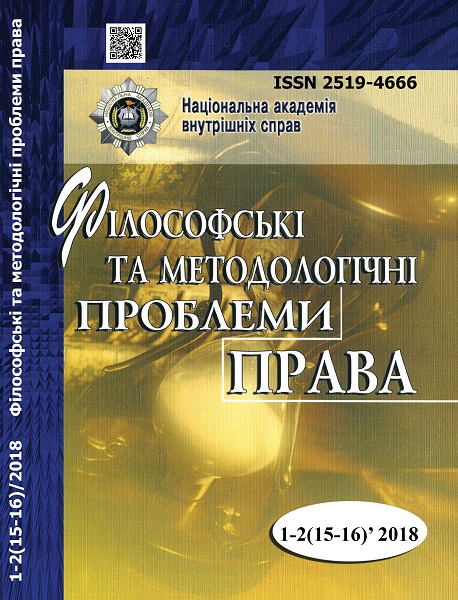Voluntary Informed Consent in Biomedical Interventions as a Part of Human Rights
Abstract
International legal and bioethical basis for biomedical interventions, scientific researches and clinical trials involving human is investigated. On the basis of the United Nations, the Council of Europe and the European Union documents, based on the principle of voluntary informed consent, the main provisions concerning proper promotion and protection of human rights in conduction of biomedical interventions, are generalized. Conduction of biomedical interventions in human body, as well as scientific research and clinical trials, is a complex bioethical problem concerning human rights. In this context, the issue of obtaining consent for their implementation requires special attention. Voluntary and informed consent to biomedical intervention is a fundamental bioethical principle for human life protection and the right to life ensuring in international law. International legal and bioethical basis for biomedical interventions, scientific researches and clinical trials involving people consists of: Nuremberg Code 1947, WMA Declaration of Helsinki 1964, Convention for the Protection of Human Rights and Dignity of the Human Being with regard to the Application of Biology and Medicine (The Oviedo Convention) 1997, Additional Protocol to the Convention on Human Rights and Biomedicine concerning Transplantation of Organs and Tissues of Human Origin 2002, Additional Protocol to the Convention on Human Rights and Biomedicine, concerning Biomedical Research, 2005, Additional Protocol to the Convention on Human Rights and Biomedicine, concerning Genetic Testing for Health Purposes 2008, Universal Declaration on the Human Genome and Human Rights 1997, Universal Declaration on Bioethics and Human Rights 2005, Charter of Fundamental Rights of the European Union 2000 and a series of directives, recommendations and regulations of the EU. On the basis of the analysis of the main provisions of the international legal acts of the UN, the Council of Europe and the European Union, based on the principle of voluntary informed consent, the following generalizations were made. A person has the right to obtain complete, objective and reliable information in a clear form about the nature, purpose, effects and possible risks of interference. Consent must be conscious and clearly expressed. Persons who are not able to give a consent (depending on the stage of their physical or mental development, health, age) need special protection. The person concerned may freely withdraw consent at any time. Protection against discrimination in deciding on interference must be guaranteed. Everyone has the right to protection of life, health and dignity before, during and after
biomedical intervention.
Downloads
Abstract views: 2014 PDF Downloads: 1630
Copyright (c) 2019 Philosophical and Methodological Problems of Law

This work is licensed under a Creative Commons Attribution-NonCommercial-NoDerivatives 4.0 International License.
- Authors reserve the right to authorship of their own work and transfer to the magazine the right of the first publication of this work under the terms of the Creative Commons Attribution License, which allows other persons to freely distribute published work with mandatory reference to authors of the original work and the first publication of an article in this magazine.
- Authors have the right to enter into separate additional agreements on non-exclusive dissemination of the work in the form in which it was published in the journal (for example, to post an article in the institution's repository or to publish as part of a monograph), provided that the link to the first publication of the work in this journal is maintained.
- The journal's policy allows and encourages the posting of articles by authors on the Internet (for example, in electronic storehouses of institutions or on personal websites), both before the submission of this manuscript to the editorial office and during its editorial processing, as this contributes to the creation of a productive scientific discussion and positively affects the efficiency and dynamics of citing the published work.




